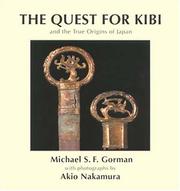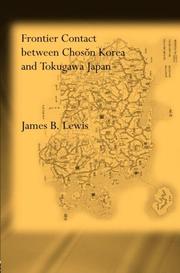| Listing 1 - 10 of 26 | << page >> |
Sort by
|

ISBN: 9748299228 9789748299228 9748299236 9789748299235 Year: 1999 Publisher: Bangkok Orchid Press
Abstract | Keywords | Export | Availability | Bookmark
 Loading...
Loading...Choose an application
- Reference Manager
- EndNote
- RefWorks (Direct export to RefWorks)
Antiquities. --- Civilization --- Archeologie. --- Oorsprong. --- Foreign influences. --- Kibi Region (Japan) --- Okayama-ken (Japan) --- Japan --- History. --- Okayama, Japan (Prefecture) --- J4000.10 --- J4812.12 --- J4810.10 --- Japan: Social history, history of civilization -- Kodai, prehistoric and ancient, premodern --- Japan: International politics and law -- international relations, policy and security -- Asia -- Korea (South) --- Japan: International politics and law -- international relations, policy and security -- kodai, prehistoric and ancient, premodern

ISBN: 1135795991 1280239344 9786610239344 0203987322 9780203987322 9780700713011 0700713018 9781135795993 9781135795948 1135795940 9781135795986 1135795983 9780415600064 0415600065 0700713018 Year: 2003 Publisher: London New York RoutledgeCurzon
Abstract | Keywords | Export | Availability | Bookmark
 Loading...
Loading...Choose an application
- Reference Manager
- EndNote
- RefWorks (Direct export to RefWorks)
East Asia from 1400 to 1850 was a vibrant web of connections, and the southern coast of the Korean peninsula participated in a maritime world that stretched to Southeast Asia and beyond. Within this world were Japanese pirates, traders, and fishermen. They brought things to the Korean peninsula and they took things away. The economic and demographic structures of Kyongsang Province had deep and wide connections with these Japanese traders. Social and political clashes revolving around the Japan House in Pusan reveal Korean mentalities towards the Japanese connection. This study seeks to d
Korea --- Japan --- Relations --- History --- J4810.60 --- J4812.12 --- K9540.50 --- K9551.11 --- Japan: International politics and law -- international relations, policy and security -- Kinsei, Edo, Tokugawa period, early modern (1600-1867) --- Japan: International politics and law -- international relations, policy and security -- Asia -- Korea (South) --- Korea: International politics, law and relations -- history -- Chosŏn period (1392-1910) --- Korea: International politics, law and relations -- Asia -- Japan
Book
ISBN: 9788961872164 Year: 2010 Publisher: Seoul Northeast Asian History Foundation
Abstract | Keywords | Export | Availability | Bookmark
 Loading...
Loading...Choose an application
- Reference Manager
- EndNote
- RefWorks (Direct export to RefWorks)
En coréen
K9540.60 --- K9551.11 --- K9551.14 --- S09/0411 --- J4812.12 --- J4810.80 --- Korea: International politics, law and relations -- history -- modern period (1860s-[1945]), 20th century general --- Korea: International politics, law and relations -- Asia -- Japan --- Korea: International politics, law and relations -- Asia -- China --- China: Foreign relations and world politics--China and Korea --- Japan: International politics and law -- international relations, policy and security -- Asia -- Korea (South) --- Japan: International politics and law -- international relations, policy and security -- Gendai (1926- ), Shōwa period, 20th century
Book
ISBN: 897114078X Year: 2006 Publisher: Seoul Dadamedia
Abstract | Keywords | Export | Availability | Bookmark
 Loading...
Loading...Choose an application
- Reference Manager
- EndNote
- RefWorks (Direct export to RefWorks)
Tok Island (Korea) --- Japan --- History. --- International status. --- History --- K9551.11 --- K9234.10 --- J4812.12 --- J3453.90 --- Korea: International politics, law and relations -- Asia -- Japan --- Korea: Geography and local history -- Kyŏngsang-pukto -- Dokdo (Tokdo, Takeshima, Liancourt rocks) --- Japan: International politics and law -- international relations, policy and security -- Asia -- Korea (South) --- Japan: Geography and local history -- Chūgoku -- Shimane prefecture (Izumo, Iwami, Oki) -- rivers, mountains and other natural features --- -Tok Island (Korea) --- -Japan --- International status --- -History --- -K9551.11 --- -J3453.90
Book
ISBN: 9788961870849 Year: 2009 Publisher: Seoul Northeast Asian History Foundation
Abstract | Keywords | Export | Availability | Bookmark
 Loading...
Loading...Choose an application
- Reference Manager
- EndNote
- RefWorks (Direct export to RefWorks)
Territory, National --- #SBIB:327.5H20 --- J3453.90 --- J3992 --- J4692 --- J4812.12 --- K9234.10 --- K9551.11 --- National territory --- Boundaries --- Vredesonderzoek: algemeen --- Japan: Geography and local history -- Chūgoku -- Shimane prefecture (Izumo, Iwami, Oki) -- rivers, mountains and other natural features --- Europe: History and geography of Europe --- Europe: Politics --- Japan: International politics and law -- international relations, policy and security -- Asia -- Korea (South) --- Korea: Geography and local history -- Kyŏngsang-pukto -- Dokdo (Tokdo, Takeshima, Liancourt rocks) --- Korea: International politics, law and relations -- Asia -- Japan

ISBN: 9788989443056 8989443059 Year: 2006 Publisher: Inchon CIRCLE
Abstract | Keywords | Export | Availability | Bookmark
 Loading...
Loading...Choose an application
- Reference Manager
- EndNote
- RefWorks (Direct export to RefWorks)
Korea --- Japan --- Relations --- Foreign relations --- K9551.11 --- K9540.60 --- K9161 --- J4812.12 --- J4810.70 --- J3374 --- Korea: International politics, law and relations -- Asia -- Japan --- Korea: International politics, law and relations -- history -- modern period (1860s-[1945]), 20th century general --- Korea: History -- Western intervention and opening of Korea (1860s-1910) --- Japan: International politics and law -- international relations, policy and security -- Asia -- Korea (South) --- Japan: International politics and law -- international relations, policy and security -- Kindai (1850s- ), bakumatsu, Meiji, Taishō --- Japan: History -- Kindai, modern -- Meiji period (1868-1912) -- imperial expansion --- Korea - Relations - Japan --- Japan - Relations - Korea --- Korea - Foreign relations - 1864-1910 --- Japan - Foreign relations - 1868-1912
Book
ISBN: 9780815367093 9781138786639 9781315767208 9781317662723 9781317662730 Year: 2014 Publisher: New York : Routledge,
Abstract | Keywords | Export | Availability | Bookmark
 Loading...
Loading...Choose an application
- Reference Manager
- EndNote
- RefWorks (Direct export to RefWorks)
"As East Asia regains its historical position as a world centre, information on the history of regional relations becomes ever more critical. Astonishingly, Northeast Asia enjoyed five centuries of international peace from 1400 to 1894, broken only by one major international war--the invasion of Korea in the 1590s by Japan's ruler Hideyoshi. This war involved Koreans, Japanese, Chinese Southeast Asians and Europeans, saw the largest overseas landing in world history up to that time, and devastated Korea. It also highlighted the nature of the strategic balance in the region, presenting China's Ming dynasty with a serious threat that perhaps foreshadowed the dynasty's subsequent overthrow by the Manchus, played a major part in the establishment of the Tokugawa regime with its policy of peace and controlled access to seventeenth and eighteenth century Japan, and demonstrated the importance for regional stability of the subtle relationship of Korea to both China and Japan. This book presents a comprehensive analysis of the war and its aftermath in all its aspects--military, political, social and economic, and cultural. As such it deepens understanding of East Asian international relations and provides important insights into the strategic forces that continue to operate in the region at present"--
J3357.80 --- J4810.50 --- J4812.12 --- K9540.50 --- K9551.11 --- K9154 --- Japan: History -- Chūsei -- Azuchi-Momoyama period -- Korean campaigns (1592-1598) --- Japan: International politics and law -- international relations, policy and security -- Muromachi, Sengoku and Azuchi-Momoyama periods (1392-1615) --- Japan: International politics and law -- international relations, policy and security -- Asia -- Korea (South) --- Korea: International politics, law and relations -- history -- Chosŏn period (1392-1910) --- Korea: International politics, law and relations -- Asia -- Japan --- Korea: History -- Chosŏn period -- Japanese invasion, Imjin war (1592-1598) --- War and society --- Violence --- Collective memory --- History --- Social science --- History. --- Asia --- General. --- Korea. --- Ethnic Studies --- Korea --- China --- Japan --- East Asia --- History, Military --- History, Military. --- Politics and government. --- Foreign relations. --- Strategic aspects.

ISBN: 270681604X 9782706816048 Year: 2002 Publisher: Paris Maisonneuve & Larose
Abstract | Keywords | Export | Availability | Bookmark
 Loading...
Loading...Choose an application
- Reference Manager
- EndNote
- RefWorks (Direct export to RefWorks)
J4812.12 --- J4810.70 --- J3374.90 --- K9171 --- K9540.60 --- K9551.11 --- Japan: International politics and law -- international relations, policy and security -- Asia -- Korea (South) --- Japan: International politics and law -- international relations, policy and security -- Kindai (1850s- ), bakumatsu, Meiji, Taishō --- Japan: History -- Kindai, modern -- Meiji period -- annexation of Korea (1905-1945) --- Korea: History -- Japanese annexation period -- annexation (1905-1910) --- Korea: International politics, law and relations -- history -- modern period (1860s-[1945]), 20th century general --- Korea: International politics, law and relations -- Asia -- Japan --- Japan --- Korea --- Relations --- History
Book
Abstract | Keywords | Export | Availability | Bookmark
 Loading...
Loading...Choose an application
- Reference Manager
- EndNote
- RefWorks (Direct export to RefWorks)
Buddhist priests --- Yujŏng, --- Korea --- Japan --- History --- Foreign relations --- J3357.80 --- J4812.12 --- K9154 --- K9540.50 --- K9551.11 --- Japan: History -- Chūsei -- Azuchi-Momoyama period -- Korean campaigns (1592-1598) --- Japan: International politics and law -- international relations, policy and security -- Asia -- Korea (South) --- Korea: History -- Chosŏn period -- Japanese invasion, Imjin war (1592-1598) --- Korea: International politics, law and relations -- history -- Chosŏn period (1392-1910) --- Korea: International politics, law and relations -- Asia -- Japan --- Yujŏng, --- Songun Yujŏng, --- Samyŏngdang, --- Samyŏngdang Yujŏng, --- Samyŏngdang Taesa, --- Samyŏng Taesa, --- Im, Yu-jŏng, --- Songun Taesa, --- Sa-myŏng, --- Songun, --- Shōun, --- Isei, --- 四溟堂, --- 惟政, --- 維政, --- 유정, --- Im, Ŭng-gyu, --- Yujeong --- Tokugawa, Ieyasu --- 徳川家康 --- 松雲 --- 유정
Book
ISBN: 9780367427832 0367427834 9780367679293 0367679299 9781003000303 Year: 2021 Publisher: London Routledge
Abstract | Keywords | Export | Availability | Bookmark
 Loading...
Loading...Choose an application
- Reference Manager
- EndNote
- RefWorks (Direct export to RefWorks)
"This book is a study of how the theories and actual practices of a Pan-Asian empire were produced during Japan's war, 1931-1945. As Japan invaded China and conducted a full-scale war against the United States in the late 1930s and early 1940s, several versions of a Pan-Asian empire were presented by Japanese intellectuals, in order to maximize wartime collaboration and mobilization in China and the colonies. A broad group of social scientists - including Rōyama Masamichi, Kada Tetsuji, Ezawa Jōji, Takata Yasuma and Shinmei Masamichi - presented highly politicized visions of a new Asia characterized by a newly shared Asian identity. Critically examining how Japanese social scientists contrived the logic of a Japan-led East Asian community, Part I of this book demonstrates the violent nature of imperial knowledge production which buttresses colonial developmentalism. In Part II, the book also explores questions around the (re)making of colonial Korea as part of Japan's regional empire, generating theoretical and realistic tensions between resistance and collaboration. Japan's Pan-Asian Empire provides original theoretical perspectives on the construction of a multi-ethnic and multi-cultural empire. It will appeal to students and scholars of modern Japanese history, colonial and postcolonial studies, as well as Korean studies"--
Imperialism --- J3374.90 --- J3385 --- J4804 --- J4810.80 --- J4812.12 --- K9170 --- History --- Japan: History -- Kindai, modern -- Meiji period -- annexation of Korea (1905-1945) --- Japan: History -- Gendai, modern -- Shōwa period -- World War II -- invasion of Asia (1931-1945) --- Japan: International politics and law -- colonial conditions, organization and administration --- Japan: International politics and law -- international relations, policy and security -- Gendai (1926- ), Shōwa period, 20th century --- Japan: International politics and law -- international relations, policy and security -- Asia -- Korea (South) --- Korea: History -- Japanese annexation period (1905-1945) --- Japan --- Korea --- East Asia --- Foreign relations --- Politics and government --- Relations --- History of Asia --- anno 1930-1939 --- anno 1940-1949 --- North Korea --- South Korea
| Listing 1 - 10 of 26 | << page >> |
Sort by
|

 Search
Search Feedback
Feedback About
About Help
Help News
News